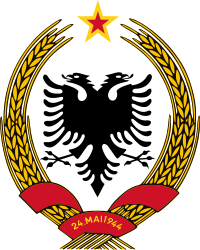- Sigurimi
-
Directorate of State Security Drejtoria e Sigurimit të Shtetit 
Sigurimi Agency overview Formed 20 March 1943 Preceding agency SHIK Dissolved 12 July 1991 Headquarters Tirana, Socialist Albania Minister responsible Gramoz Ruçi, Minister of Sigurimi Parent agency Socialist Albanian Governement The Drejtoria e Sigurimit të Shtetit (Directorate of State Security), commonly called the Sigurimi, was the state security, intelligence and secret police service of the Socialist People's Republic of Albania.[1] De juro its goal was protecting Albania from dangers, but de facto used to suppress the population and held the system in place.[1]
In 2008 the Albanian parliament discussed opening the so called sigurimi files but the Socialist Party of Albania contested it.[2]
Contents
History
The Sigurimi was created on 20 March 1943. Enver Hoxha typically credited the Sigurimi as having been instrumental in his faction's gaining power in Albania over other partisan groups. The People's Defense Division, formed in 1945 from Leshi's most reliable resistance fighters, was the precursor to the Sigurimi's 5,000-strong uniformed internal security force. In 1989 the division was organized into five regiments of mechanized infantry that could be ordered to quell domestic disturbances posing a threat to the party leadership. The Sigurimi had an estimated 10,000 officers, approximately 2,500 of whom were assigned to the People's Army.
The organization ceased to exist in name in July 1991 and was replaced by the National Informative Service (SHIK). In early 1992, information on the organization, responsibilities, and functions of the SHIK was not available in Western publications. Some Western observers believed, however, that many of the officers and leaders of the SHIK had served in the Sigurimi and that the basic structures of the two organizations were similar.
Activities
The mission of the Sigurimi was to prevent counterrevolution and to suppress opposition to the regime. Although groups of Albanian émigrés sought Western support for their efforts to overthrow the communists in the late 1940s and early 1950s, they quickly ceased to be a credible threat to the communist regime because of the effectiveness of the Sigurimi.
The activities of the Sigurimi were directed more toward political and ideological opposition than crimes against persons or property, unless the latter were sufficiently serious and widespread to threaten the regime. Its activities permeated Albanian society to the extent that every third citizen had either served time in labor camps or been interrogated by Sigurimi officers. Sigurimi personnel were generally career volunteers, recommended by loyal party members and subjected to careful political and psychological screening before they were selected to join the service. They had an elite status and enjoyed many privileges designed to maintain their reliability and dedication to the party.
Organization
The Sigurimi had a national headquarters and district headquarters in each of Albania's twenty-six districts.
It was further organized into sections covering political control, censorship, public records, prison camps, internal security troops, physical security, counterespionage, and foreign intelligence.
The political control section's primary function was monitoring the ideological correctness of party members and other citizens. It was responsible for purging the party, government, military, and its own apparatus of individuals closely associated with Yugoslavia, the Soviet Union, or China after Albania broke from successive alliances with each of those countries. One estimate indicated that at least 170 communist party Politburo or Central Committee members were executed as a result of the Sigurimi's investigations. The political control section was also involved in an extensive program of monitoring private telephone conversations.
The censorship section operated within the press, radio, newspapers, and other communications media as well as within cultural societies, schools, and other organizations.
The public records section administered government documents and statistics, primarily social and economic statistics that were handled as state secrets.
The prison camps section was charged with the political reeducation of inmates and the evaluation of the degree to which they posed a danger to society. Local police supplied guards for fourteen prison camps throughout the country.
The physical security section provided guards for important party and government officials and installations.
The counterespionage section was responsible for neutralizing foreign intelligence operations in Albania as well as domestic movements and parties opposed to the Party.
Finally, the foreign intelligence section maintained personnel abroad and at home to obtain intelligence about foreign capabilities and intentions that affected Albania's national security. Its officers occupied cover positions in Albania's foreign diplomatic missions, trade offices, and cultural centers.
See also
- History of Albania
- Eastern Bloc politics
References
- ^ a b Taru Bahl, M. H. Syed. Encyclopaedia of the Muslim World. p. 176. http://books.google.nl/books?id=ceW4dR78ubEC&pg=PA176&dq=Sigurimi&hl=nl&ei=ZiunTai_J4rrOaSV_MEJ&sa=X&oi=book_result&ct=result&resnum=2&ved=0CC0Q6AEwAQ#v=onepage&q=Sigurimi&f=false. Retrieved 2011-04-14.
- ^ Sigurimi-dossiers blijven gesloten in Albanië Mondiaal Nieyws
External links
- Library of Congress Country Study of Albania – Data as of April 1992
Secret police agencies in Communist Eastern Europe Soviet Union Socialist People's Republic of Albania Directorate of State Security (Sigurimi)People's Republic of Bulgaria Czechoslovak Socialist Republic German Democratic Republic People's Republic of Hungary People's Republic of Poland Socialist Republic of Romania Socialist Federal Republic of Yugoslavia Categories:- Albanian intelligence agencies
- Defunct intelligence agencies
- Defunct law enforcement agencies of Albania
- Eastern Bloc
- Law enforcement in communist states
- Socialist People's Republic of Albania
Wikimedia Foundation. 2010.
